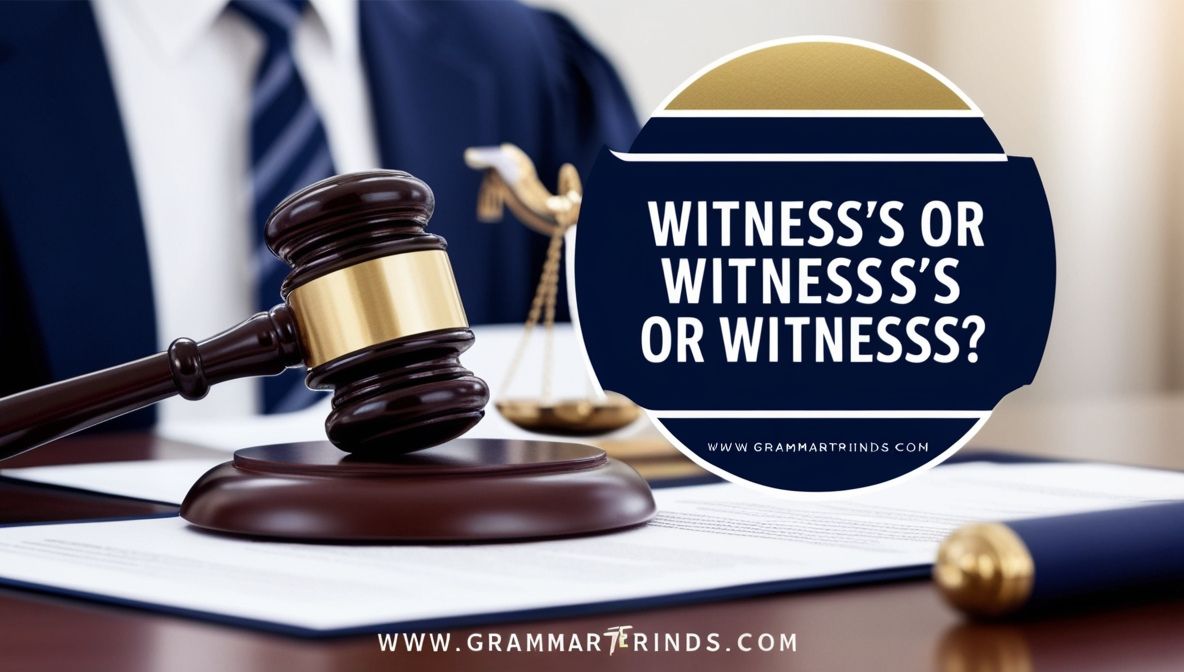Witness’ or Witness’s or Witness? can trip up even seasoned writers. The confusion often comes down to understanding apostrophe use, especially with singular nouns ending in s and plural nouns ending in s. Whether you’re handling witness testimony in legal documents or writing everyday sentences, getting the possessive forms right is crucial for clarity and professionalism.
In legal settings like court cases and police investigation reports, precision in language matters. Misusing apostrophes can blur the meaning of a witness account or affect how a witness’s description is interpreted. This article breaks down the rules, highlights style guide preferences, and offers practical tips so you can master these tricky grammar points with confidence.
Singular Possessive: When to Use Witness’s
For singular nouns ending in s, like witness, the general rule is to add ’s to show possession. So, witness’s is typically correct.
Scenario: If a single witness describes what happened, you write: The witness’s account was detailed and clear. Here, the apostrophe and s show that the account belongs to one witness.
Tip: When in doubt, add ’s to singular nouns even those ending in s unless a style guide advises otherwise.
Synonyms: Testimony, account, statement
Plural Possessive: Understanding Witness’
When more than one witness is involved, the plural form is witnesses. To show possession, place the apostrophe after the s, forming witnesses’.
Scenario: The witnesses’ statements all supported the defendant’s alibi. This means multiple witnesses gave statements.
Tip: If the noun is plural and ends with s, just add the apostrophe after the s to avoid awkwardness.
Using Witness Without Possession
Sometimes, you only need the word witness as a simple noun, with no possession involved.
Scenario: The witness testified confidently in court. Here, no apostrophe is needed.
Tip: Avoid adding apostrophes unless showing possession or contraction keep it clean.
Why Apostrophe Use Matters in Legal Writing
In court cases, every detail counts. Misplaced apostrophes can change meaning or cause confusion. For example, witness’s vs. witness’ might affect how clear a witness testimony is presented.
Scenario: Imagine a police report stating: The witness’ description was inconsistent. If only one witness gave the description, this technically misuses the apostrophe.
Tip: Double check apostrophe placement in legal documents to maintain legal language precision and clarity.
What Style Guides Say About Witness’s and Witness’
Major style guides like the Chicago Manual of Style and the Associated Press Stylebook sometimes differ on apostrophe rules for singular nouns ending in s.
| Style Guide | Singular Possessive Example | Notes |
|---|---|---|
| Chicago Manual of Style | witness’s | Recommends adding ’s |
| Associated Press Stylebook | witness’ | Suggests just an apostrophe after s |
Tip: Choose a style guide and stay consistent throughout your writing.
Practical Tips to Avoid Apostrophe Confusion
- Ask if the noun is singular or plural.
- For singular nouns ending in s, add ’s (witness’s).
- For plural nouns ending in s, add apostrophe after s (witnesses’).
- When not showing possession, don’t add apostrophes.
- Use synonyms like account or statement to rephrase if it feels awkward.
Apostrophes Beyond Possession: Contractions and Plurals
Unlike possession, apostrophes in contractions shorten words (like it’s for it is). Apostrophes should never form plurals.
Scenario: It’s important to record the witness testimony. (contraction) Incorrect plural: There were many witness’s at the scene. (wrong)
Tip: Remember: apostrophes never make a noun plural.
Real Examples From Court Cases
In many courtroom language clarity efforts, attorneys and clerks emphasize correct apostrophe use. For instance, The witness’s recollection is often preferred in formal transcripts to avoid confusion with plural forms.
Tip: Review official documents or transcripts for best practices in legal writing.
Summary of Witness Apostrophe Rules
| Noun Type | Possessive Form | Example Sentence |
|---|---|---|
| Singular (ends in s) | Add ’s | The witness’s statement was credible. |
| Plural (ends in s) | Add apostrophe after s | The witnesses’ testimonies matched. |
| No possession | Use noun as is | The witness arrived early. |
Frequently Asked Questions
Is “witness’s” always correct for singular possessive?
Yes, most style guides recommend adding ’s for singular possessive nouns ending in s.
Can I use “witness’” for singular possessive?
Some style guides allow it, but it’s less common and can cause confusion.
Should I ever use an apostrophe to make “witness” plural?
No, apostrophes do not make nouns plural. The plural is witnesses without an apostrophe.
Final Thoughts
Understanding witness’ or witness’s or witness? doesn’t have to be hard. The key is knowing when to use the apostrophe and where to place it. Remember, witness’s shows something belongs to one witness. Use witnesses’ for more than one. And if there’s no possession, just use witness without an apostrophe. Clear writing matters, especially in legal settings. Following these simple rules will help you avoid mistakes. Soon, you’ll write with confidence and make your meaning clear every time. Keep practicing, and apostrophes won’t trip you up again!
